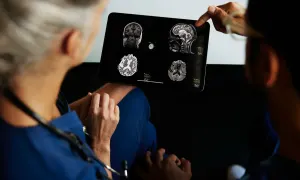This type of treatment focuses precise radiation beams from a machine at the tumor from hundreds of different angles for a short period of time. (There is no actual surgery or knife involved in this treatment.) It may be useful for some tumors in parts of the brain or spinal cord that can't be treated with surgery or when a patient's health does not permit surgery.
Some people may become irritable and fatigued during the course of radiation therapy. Nausea, vomiting and headaches are also possible but are uncommon. If needed, drugs can help relieve these symptoms.
A person may lose some brain function if large areas of the brain receive radiation. Problems can include memory loss, personality changes and trouble concentrating. There may also be other symptoms depending on the area of brain treated and how much radiation is given. These risks must be balanced against the risks of not using radiation and having less control of the tumor.
Rarely after radiation therapy, a large mass of dead (necrotic) tissue forms at the site of the tumor. This occurs months to years after radiation is given and is called radiation necrosis. Though this can often be controlled with drugs, surgery may be needed to remove the necrotic tissue in some instances.
Radiation can damage genes in normal cells. As a result, there is a small risk of developing a second cancer in an area that got radiation—for example, a meningioma of the coverings of the brain, another brain tumor, or less likely, a bone cancer in the skull. If this does occur, it is usually many years after the radiation is given. This small risk should not prevent those who need radiation from getting treatment.
Continue Learning about Brain Tumors
Important: This content reflects information from various individuals and organizations and may offer alternative or opposing points of view. It should not be used for medical advice, diagnosis or treatment. As always, you should consult with your healthcare provider about your specific health needs.



